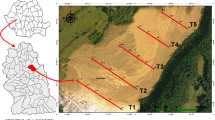Abstract
RECENT quantitative analyses of the microfauna of the soil have shown that oribatid mites are by far the largest representatives. Their economic value is well known; they carry the infective stages of anoplocephaline cestodes, some of which are important parasites of sheep. Attention has recently been directed to their role in the promotion of humus formation from leaf litter on the forest floor, and at the same time it was pointed out that little was known of the biology of these mites1.
This is a preview of subscription content, access via your institution
Access options
Subscribe to this journal
Receive 51 print issues and online access
$199.00 per year
only $3.90 per issue
Buy this article
- Purchase on Springer Link
- Instant access to full article PDF
Prices may be subject to local taxes which are calculated during checkout
Similar content being viewed by others
References
Report on Forestry Research for the Year ending March 1950 (H.M. Stationery Offiee, 1951).
Jones, B. M., Nature, 166, 823 (1950).
Jones, B. M. (private communication).
Michael, A. D., “British Oribatidæ” (Ray Society, London, 1883).
Author information
Authors and Affiliations
Rights and permissions
About this article
Cite this article
CLEAT, N. Growth in the Laboratory of Economically Important Oribatid Mites. Nature 169, 280–281 (1952). https://doi.org/10.1038/169280b0
Issue Date:
DOI: https://doi.org/10.1038/169280b0
This article is cited by
-
Toxicological evaluation of genetically modified cotton (Bollgard®) and Dipel® WP on the non-target soil mite Scheloribates praeincisus (Acari: Oribatida)
Experimental and Applied Acarology (2007)
Comments
By submitting a comment you agree to abide by our Terms and Community Guidelines. If you find something abusive or that does not comply with our terms or guidelines please flag it as inappropriate.



